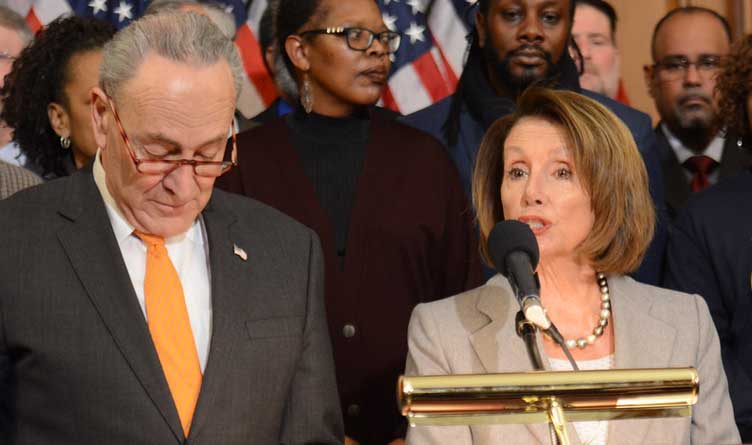H.R. 1 Would Implode The Rights Of States In Administering Their Own Elections. But There Is Also An Aspect Of H.R. 1 That Has Not Been Much Discussed, And That’s The Silencing Of Speech.
Photo: Nancy Pelosi and Chuck Schumer at Press Conference
Photo Credit: AFGE / CC
Published April 7, 2021
The Center Square [By Chris Krug] –
We live in the United States of America – not the United State of America.
Our Constitution was written to restrain the federal government by empowering the states. That’s one key element that separates our country from virtually every other country in the world.
There is no more out-of-touch, wasteful or inefficient strata of our government than the federal level. Look no further than the ongoing, drunken-uncle spending of other people’s money – indeed, our money – in “stimulus” bills passed by the same politicians who keep our economy closed.
The federal government is the farthest removed authority from the day-to-day lives of Americans and – by its nature – can’t know the best way to do any kind of business in every state. Elections managed at the state level, for instance, preserve a check on the federal government and ensure that all voices are heard.
So when you see federal legislation such as H.R. 1, a 791-page election reform bill that would federalize our election processes, your instincts should tell you to sprint in the opposite direction. And if you cringe a little when you learn that such a bill is called the “For the People Act,” relax. You’re not alone.
And, yes, the federal government is here to fix something that isn’t broken, again.
H.R. 1 would implode the rights of states in administering their own elections. This is in response, of course, to the hundreds of election-related lawsuits filed in the wake of ballot irregularities and various kinds of legislation making their way through state capitols to push back against some uncertainty about the November 2020 elections.
You may have heard some folks cry voter suppression. We’ve heard that one before. But after the largest turnout in the history of a presidential election – one in which a three-time primary loser, 78-year-old Joe Biden, managed to get the highest vote total in U.S. election history – it rings hollow. Clearly, millions upon millions of Americans were able to get to the polls (or not get to the polls under the long, dark shadow of COVID-19) and vote.
There are three primary parts of H.R. 1’s attempt to forever change elections:
• Federalization of the voting process. One set of voting rules by which all states would have to comply, as written by one political party in the House of Representatives.
• The forfeiture of freedom in states to run their own elections. Sorry, states.
• And a single set of security protocols that would allow for questionable practices such as voting without identification, ballot harvesting (the collection of completed ballots by someone who is affiliated with a particular party who then drops off the collected ballots in the polling station), and the expansion of no-excuse absentee voting.
But there is also an aspect of H.R. 1 that has not been much discussed, and that’s the silencing of speech. Even the American Civil Liberties Union, itself a long-established organization that is normally aligned with the authors of H.R. 1, has said that language contained the bill assaults the First Amendment.
“If organizations do choose to speak, they may find themselves subject to onerous and intrusive disclosure requirements, including publishing the names and addresses of donors regardless of whether that donor supported or even knew about the communications that triggered the publication of their name,” the ACLU wrote on its blog in 2019 when the bill was first introduced.
“This could be especially burdensome for small organizations that cannot afford the compliance costs. Other organizations may simply refuse to breach the trust that donors expecting anonymity have placed in them. Under either of these results, our public discourse is less vibrant, less diverse, and less informed. In short, the First Amendment loses.”
If H.R. 1 stays in the House, free elections and free speech could have a resurrection of their own.
About the Author:

Chris Krug, The Center Square Publisher
Chris Krug brings more than 25 years of award-winning media experience to The Center Square. He is the former publisher of the Chicago Pioneer Press newspaper chain, and was vice president for Shaw Suburban Media and a deputy editor at the Denver Post.






